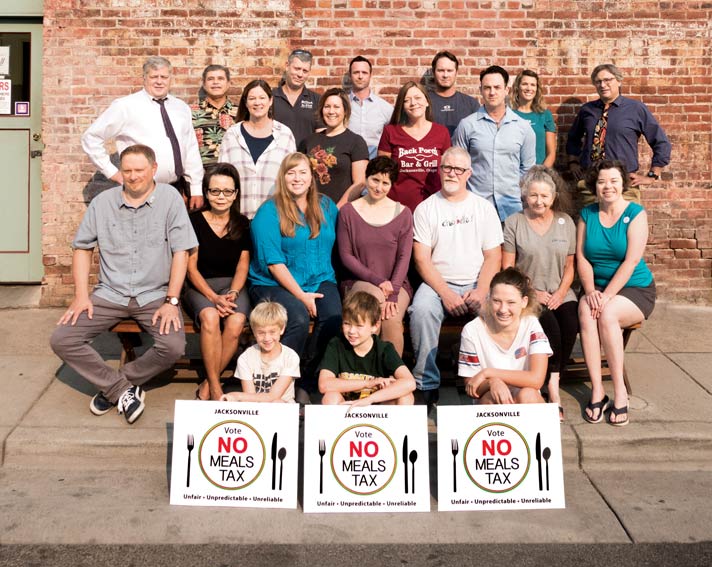Background—After the City Council implemented a $20/month Police Surcharge to pay for police services and augment the General Fund, three citizens, led by Doug Phillips, decided that they had a “better idea.” They collected enough signatures to place the matter on the November ballot. If passed, a 5% meals tax will last for 10 years and be the ONLY source of revenue to fund our 5-man Police Department. Despite a lack of evidence, the tax proponents believe a tax on food will provide adequate funding—the Review strongly disagrees with this assumption.
Why a Meals Tax?—The meals tax was first brought up in 2016 by Doug Phillips, one of the 7-citizen Budget Committee members. The Budget Committee and our 7 City Councilors, meet several time a year to formulate the city budget, stay abreast of city finances and discuss strategies and options.
After careful study, the Budget Committee and Council rejected a meals tax by a 13-1 vote and opted instead to recommend that the City Council impose a $20 surcharge. Implemented this July, the surcharge will now raise $400,000/year for Police Department and General Fund purposes. It is stable and predictable and not subject to the ups and downs of restaurant receipts. Had our 2018 Police funding been based upon restaurant sales this July and August, it would have been a disaster. Why? Tax collections would be down 40%, thanks to restaurant business being hit hard by wildfire smoke and a lack of diners. Funding police operations on the number of hamburgers, pizza and other fare sold is risky—it was a main reason the Budget Committee and City Council rejected the idea.
Tax Facts—Jacksonville has the second-lowest tax rate of $1.84/1000 assessed value in the County. When you add property taxes + $20 Police Surcharge + $35 Fire Department Surcharge + $3 Parks Fee, Jacksonville residents still pay far less than almost every other city in Jackson County for basic city services. Personally, I’m proud to pay $20 for such professional police service that keeps my family safe.
Relief Available—Jacksonville has a relief program so that lower-income residents can opt out of the surcharges. Those earning less than $25,000/year pay NO Police or Fire Surcharge and those earning $25,001- $30,000 pay half. To apply, contact City Hall. The process is 100% confidential and NO names of participants will ever be released and be made public.
Burdening Restaurants—To raise $400,000/year via a 5% meals tax (and pay for administering the program,) 14 restaurants must have sales in excess of $9,000,000 in food-only sales. Mr. Phillips has not—and will not—answer important questions. Most notably, he has no hard numbers on ACTUAL sales and is basing food sales on a guess. A GUESS. He counted restaurant tables and assumes they turn over 2.5x/day/365 days. As a former professional auditor, he should know better than trying to fool the people with made up data.
Jacksonville Isn’t Ashland—Mr. Phillips cites Ashland as proof that a meals tax will work here. Ashland has 166 restaurants; Jacksonville has 14. Jacksonville’s influx of visitors is in June, July and August. Ashland’s 9-month tourist season runs from February until late October, fed by the Oregon Shakespeare Festival. OSF sells 380,000 tickets to more than 100,000 unique attendees. Britt Festivals sold 63,156 tickets in 2017, 80% to Rogue Valley residents. The population of Ashland is 22,000; Jacksonville is nearing 3000. Britt’s operating budget is approximately $3.5 million; OSF is $40 million.
Funding our Police operations based upon Ashland numbers is a mistake. The Ashland meals tax is used to purchase land for public parks and public water systems. If Ashland’s meals tax comes up short, they don’t have to layoff officers.
A Tough Business—If a meals sales tax drives away a fraction of locals and visitors, the impact could be devastating. In 2018, Oregon’s minimum wage increased and will do so two more times in the next 2 years, placing even more stress on the restaurants’ bottom line. Our family-operated restaurants are an unfair target of this sales tax—it’s discriminatory and another reason why the Budget Committee and City Council rejected a meals tax.
Police Calls—The meals tax proponents argue that “Visitors should pay their fair share for police services.” Fact: in 2017, the Jacksonville PD responded to 2454 calls—55 involved a restaurant, less than 2% of total calls.
The “Un” Tax—A meals tax is unfair, unstable and unpredictable. During the winter months, business declines sharply and many restaurants operate at a loss. This year, wildfire smoke, just like in 2017, has led to a sharp decline in visitor and local dining. With wildfires as the new “reality,” dining will likely decline in the next 10 years, the life-span of this proposed tax.
Bottom Line—Our friends and neighbors on the Budget Committee and City Council voted 13-1 for a stable and reliable $20 Police surcharge. In response to his idea being rejected, Mr. Phillips has targeted the most fragile sector of the Jacksonville business community, placing our business community, Police Department and town at great risk. Please join the Review in voting NO MEALS TAX!
Featured image: Jacksonville restaurant owners and their families gather together to urge you to please vote NO!

As a taxpayer and a small businessman with a share of restaurant ownership, I have to say that sane people DO NOT LIKE taxes. But, if the people of Jacksonville decide to pass this insane tax, be sure to move also on increasing the minimum wage of your restaurant workers to $15/hour, so that your restaurants will be guaranteed to go out of business.